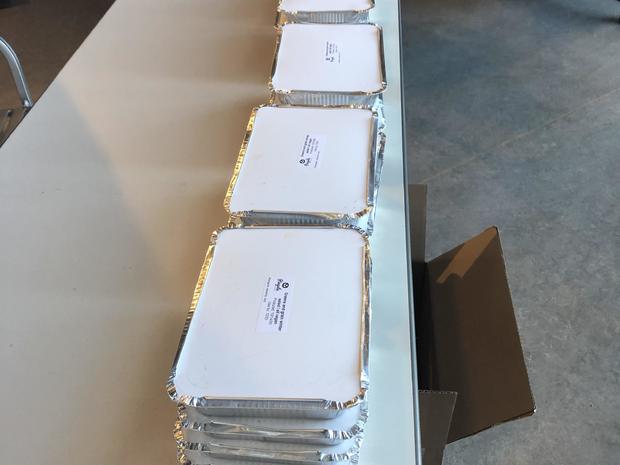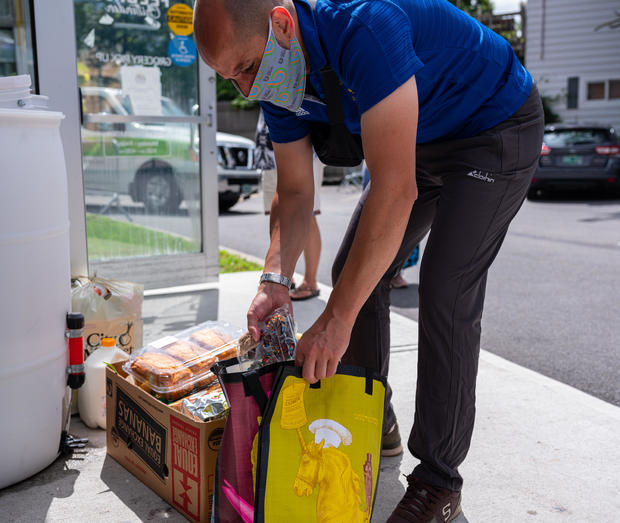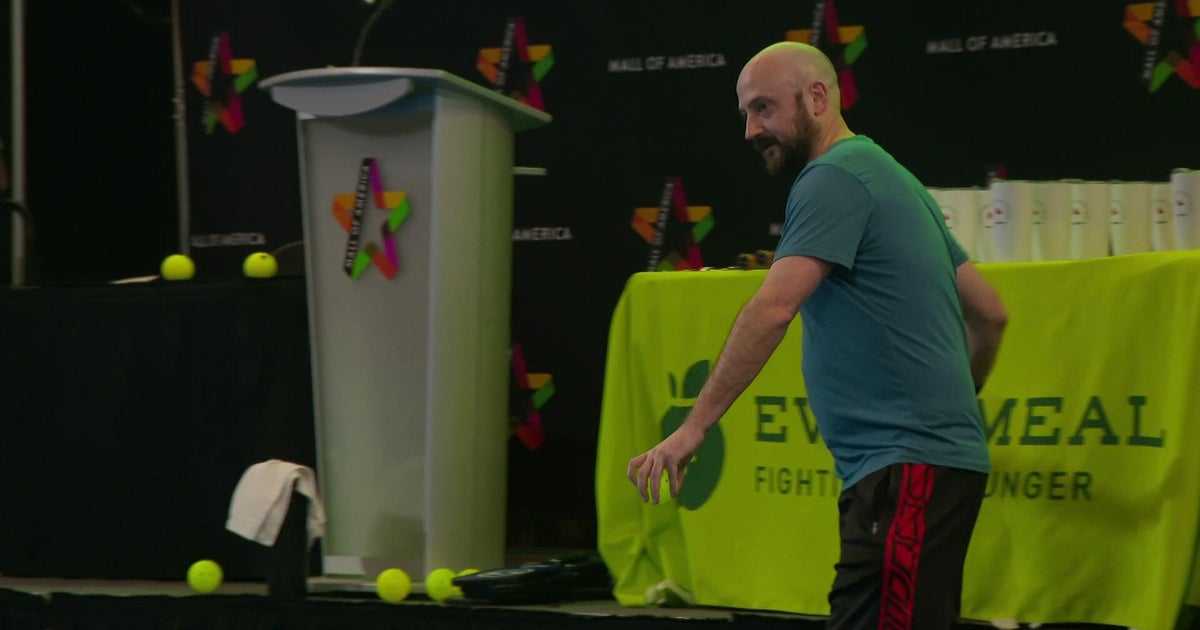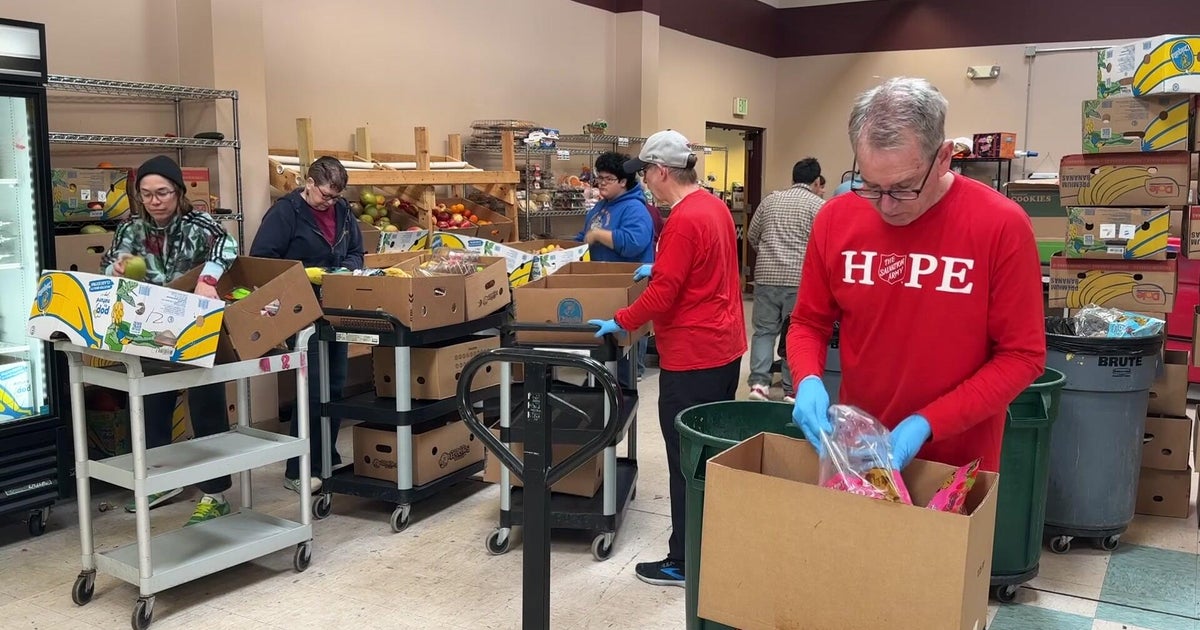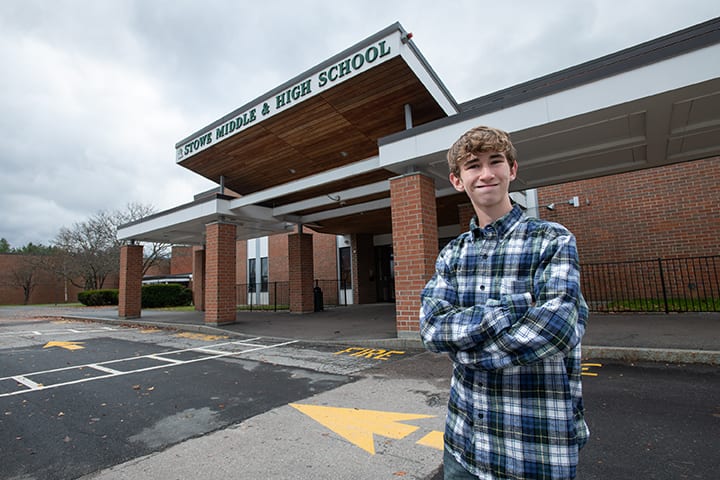As Americans go hungry, an innovative free-meal program is running out of money and time
A table set up in the lobby of a children's science museum in Burlington, Vermont, was running low on free meals after giving away almost 200 of the packaged lunches. As the last patron wandered in from the frigid weather and took one of the meals — a winter salad with tahini sauce prepared by a local restaurant — organizer Brittany Sperber told him, "We're here for the next two weeks."
After that, it's unclear whether more meals will be provided through the program, an innovative service called Vermont Everyone Eats that was funded with $6 million from the Coronavirus Aid, Relief, and Economic Security (CARES) Act. Although hunger in Vermont and across the U.S. is surging during the coronavirus pandemic, the program's funding will expire on December 30, when any unused funds must be returned to the federal government.
Programs like Vermont Everyone Eats were launched through $150 billion in CARES Act money earmarked for state and local governments — aid that has helped pay for everything from addressing food insecurity to helping rural hospitals cope with a flood of COVID-19 cases. But the survival of Vermont Everyone Eats, as well as hundreds of other state programs that sprang up in the crisis' wake, is at stake as congressional leaders negotiate another round of stimulus for individuals and businesses.
For now, hopes of securing more funding look dim. A proposal in Washington, D.C., to provide an additional $160 billion in aid to state and local governments faces stiff opposition from Republicans, and has now been carved off into a separate bill.
Vermont Everyone Eats, which launched in August, arose from grassroots efforts to address two issues: rising food insecurity and the blow to restaurants after the pandemic forced them to close. It also partly sprang out of an effort called ShiftMeals created by local creperie chain Skinny Pancake, which, like the entire restaurant industry, was jolted by the coronavirus outbreak.
Skinny Pancake "like so many restaurants, had to close because COVID was raging and the Vermont government shutdown restaurants," said ShiftMeals director Jean Hamilton. "That catalyzed the leadership team of Skinny Pancake to think about how it could support its employees and community."
Boosting the economy by fighting poverty
Vermont restaurants were ordered to shut by Governor Phil Scott on March 13, but ShiftMeals served its first free meals to out-of-work Vermonters on March 24, Hamilton said. It was clear from the start that its model would need to look beyond philanthropy for support, she added. Eventually, the program worked with others in the state, including government officials, local restaurants and other stakeholders, to develop a pilot program, and soon landed CARES Act funding.
"It's a new revelation of the power of doing poverty relief and economic development at the same time," Hamilton said.
By the end of December, Vermont Everyone Eats' $6 million in funding will have paid for 500,000 meals — prepared by more than 100 restaurants — that were provided free of charge to residents in need. Participating restaurants also pledged to buy 10% of their ingredients from local farmers and producers, benefiting another cornerstone of the state's economy.
Some restaurants have told Stephanie Bonin, executive director of the Brattleboro hub for Vermont Everyone Eats, that the program accounts for between 40% and 80% of their revenue.
"I know that it's keeping our local restaurants in business," she said.
But with uncertainty over whether Congress will provide more funding for cash-strapped states and localities, the future of Vermont Everyone Eats is in doubt.
"That is the scary unknown: What happens to the program on January 1?" said Gary Holloway, downtown program manager for the Vermont Agency for Commerce and Community Development, who worked on developing the program. "It's going to be a pretty dark first quarter for the [restaurant] industry. It's also typically the hardest time of year for people who are food insecure."
Widespread food insecurity
In Vermont, the need for food aid remains high despite a decrease in the unemployment rate. The state's jobless rate fell to 3.2% in October, the second lowest in the nation after Nebraska, after peaking at 15.6% in April.
But that figure doesn't capture the thousands of Vermonters who aren't counted as jobless because they're unable to return to work or who have had their hours cut due to the pandemic, said John Sayles, chief executive of Vermont Foodbank and a member of the steering committee of Vermont Everyone Eats.
Before the pandemic, about 1 in 10 people in Vermont were food insecure, but that jumped to 1 in 3 in late spring, Sayles said. Today, roughly a quarter of the state's residents experience food insecurity, which the Department of Agriculture defines as having reduced access to nutritious and varied food.
"There are people who are not 'food insecure' but still need this kind of support," such as through the Everyone Eats program, Sayles said. "I think we are probably serving a third of the state right now."
Hunger is on the rise around the U.S., as the nation grapples with the coronavirus pandemic, though some states, like Vermont, are experiencing sharper spikes than others. More than 50 million Americans will experience food insecurity this year, an increase of 15 million people since before the pandemic, according to Feeding America.
Restaurant rescue
Before Vermont Everyone Eats sprang up, Burlington, Vermont-based vegan restaurant Pingala was facing a double-whammy. Business at its restaurant was down 35%, while its food truck had been sidelined this summer after festivals were canceled due to the pandemic. The decline prompted owner Trevor Sullivan to consider cutting costs by giving up his separate prep kitchen, which is located in a neighboring town.
"Losing that stream of revenue, we were like, 'How do we justify this space this year?' We even considered moving — our lease was coming up — maybe we should go back to square one," Sullivan recalled.
But Vermont Everyone Eats helped replace some of the lost revenue and enabled the business to keep the prep kitchen. Pingala now uses the space to prepare about 1,200 meals per week for the program, including the winter salad provided at the science center. In two months alone, Vermont Everyone Eats has provided almost 9% of Pingala's annual revenue, said operations manager Lisa Bergström.
Bergström and Sullivan are hopeful that other sources of revenue could help support the program in January, or that more stimulus money would be allocated by Congress. Currently, the program is seeking funding from philanthropies as well as FEMA, although it's unclear whether those funds will materialize, said Steve Geller, executive director of Southeastern Vermont Community Action, which administers the Everyone Eats program.
The idea is similar to World Central Kitchen, the emergency food relief program created by chef José Andrés and which is funded by individual donors, foundations and businesses. But filling a gap of $6 million through donations alone could be a longshot in a state like Vermont, where the need is great but pockets tends be shallower than in wealthier states.
In the meantime, the organizers behind Vermont Everyone Eats — which has provided meals in every county in the state — are worried about hungry families and the survival of local restaurants.
"We're up to 1,050 meals a day, Monday to Thursday — that will just stop at the end of December," Bonin of the Brattleboro hub for Everyone Eats, said. "This program shouldn't end. This program is meeting the needs of our community and the scale of the pandemic is so huge, so it's the worst idea to stop this program on [December 30]."
